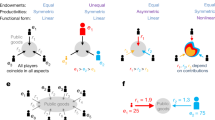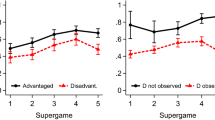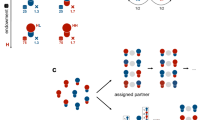Abstract
An experiment evaluated the effects of reciprocal behavior of a confederate on the behavior of a participant under concurrent individual and shared contingencies. The experimental situation consisted of solving a puzzle on two synchronized computer screens. Sixteen female and male university students were assigned to the same number of dyads, in which the other member was a confederate. They were divided into four groups of four dyads each. Groups 1 and 3 were exposed to an ascending percentage of reciprocal behavior by the confederate (0, 50, and 100%) whereas groups 2 and 4 were exposed to a descending percentage (100, 50, and 0%). All groups were exposed to two shared contingency situations: partial altruism, in which no points or tokens were provided, and unequal, and asymmetric labor exchange, in which different amounts of valuables were exchanged for earned points. Groups 1 and 2 were first exposed to the partial altruism situation whereas groups 3 and 4 were first exposed to the labor exchange situation. Results show that participants in all groups matched the reciprocal behavior of confederates, resulting in partial altruism during percentages larger than 0 in both conditions, with and without points and earnings. These results confirm previous findings suggesting that reciprocity is a function of the behavior of at least one of the members of the dyad. Results are also discussed in relation to the functional relevance for the occurrence of cultural and economic interactions.






Similar content being viewed by others
References
Ávila, A. (2017). La reciprocidad humana en interacciones diádicas: Análisis conceptual y experimental (Doctoral thesis). Xalapa, México: Universidad Veracruzana.
Bolton, G. E., & Ockenfels, A. (2000). ERC: A theory of equity, reciprocity and competition. American Economic Review, 90(1), 166–193. https://doi.org/10.1257/aer.90.1.166.
Fehr, E., & Schmidt, K. M. (1999). A theory of fairness, competition, and cooperation. Quarterly Journal of Economics, 114(3), 817–868. https://doi.org/10.1162/003355399556151.
Gewirtz, J. L. (Ed.). (1972). Attachment and dependency. Washington, DC: V. H. Winston & Sons.
Gewirtz, J. L., & Kurtines, W. M. (Eds.). (1991). Intersections with attachment. Hillsdale, NJ: Lawrence Erlbaum Associates.
Güth, W., Schmittberger, R., & Schwarze, B. (1982). An experiment analysis of ultimatum bargaining. Journal of Economic Behavior and Organization, 3, 367–388. https://doi.org/10.1016/0167-2681(82)90011-7.
Hackenberg, T. D. (2009). Token reinforcement: A review and analysis. Journal of Experimental Analysis of Behavior, 91(2), 257–286. https://doi.org/10.1901/jeab.2009.91-257.
Homans, G. C. (1961). Social behavior: Its elementary forms. New York, NY: Harcourt Brace & Work.
Ogunlade, J. O. (1977). Some effects of asymmetry of rewards on productivity in simulated industrial groups. Social Behavior and Personality, 5(1), 73–80. https://doi.org/10.2224/sbp.1977.5.1.73.
Pulido, L., Rangel, N., & Ortiz, G. (2014). Efecto del tipo de contingencia en el establecimiento y cualidad de intercambios verbales: Su papel en la elección de alternativas compartidas. Journal of Behavior, Health & Social Issues, 6(2), 71–86.
Pulido, L., Ribes, E., López, I., & López, B. (2015a). Interacciones altruistas totales como función de la inducción de reciprocidad. Revista Mexicana de Análisis de la Conducta, 41(1), 32–52.
Pulido, L., Ribes, E., López, I., & Reza, A. (2015b). Interacciones competitivas como función de la inducción de reciprocidad. Acta Comportamentalia, 23(4), 359–374.
Rangel, N., Pulido, L., Ávila, A., Ordoñez, S., & Ribes, E. (2015). Partial altruistic interactions as a function of reciprocity induction and written declarations. European Journal of Behavior Analysis, 16(1), 31–48. https://doi.org/10.1080/15021149.2015.1065639.
Ribes, E., Rangel, N., Casillas, J., Álvarez, A., Gudiño, M., Zaragoza, A., & Hernández, H. (2003). Inequidad y asimetría de las consecuencias en la elección entre contingencias individuales y sociales. Revista Mexicana de Análisis de la Conducta, 29(2), 385–401.
Ribes, E., Rangel, N., Magaña, C., López, A., & Zaragoza, A. (2005). Efecto del intercambio diferencial equitativo e inequitativo en la elección de contingencias sociales de altruismo parcial. Acta Comportamentalia, 13(2), 159–179.
Ribes, E., Rangel, N., Zaragoza, A., Magaña, C., Hernández, H., Ramírez, E., & Valdez, U. (2006). Effects of differential and shared consequences on choice between individual and social contingencies. European Journal of Behavior Analysis, 7, 41–56.
Ribes, E., Rangel, N., Ramírez, E., Valdez, U., Romero, C., & Jiménez, C. (2008). Verbal and non-verbal induction of reciprocity in a partial-altruism social interaction. European Journal of Behavior Analysis, 9(1), 53–72.
Ribes, E., Rangel, N., Pulido, L., Valdez, U., Ramírez, E., Jiménez, C., & Hernández, M. (2010). Reciprocity of responding as a determinant of partial-altruistic behavior in humans. European Journal of Behavior Analysis, 11(2), 105–114.
Ribes, E., Pulido, L., Rangel, N., & Sánchez-Gatell, E. (2016). Sociopsicología. Instituciones y relaciones interindividuales. Madrid, Spain: La Catarata.
Schmandt-Besserat, D. (1992). Before writing. (2 vols). Austin, TX: University of Texas Press.
Sinha, J. B., & Sinha, S. R. (1975). In response to the pressure to reduce disparity. Indian Journal of Psychology, 50(2), 108–121.
Spiegler, M. D. (2016). Contemporary behavior therapy (6th ed.). Boston, MA: Cengage Learning.
Sundel, M., & Sundel, S. S. (2005). Behavior change in the human services (5th ed.). Thousand Oaks, CA: Sage.
Walster, E., Walster, G. W., & Berscheid, E. (1978). Equity theory and research. Boston, MA: Allyn & Bacon.
Winkler, R. C. (1980). Behavioral economics, token economies and applied behavior analysis. In J. E. R. Staddon (Ed.), Limits to action (pp. 269–297). New York, NY: Academic Press.
Xiao, E., & Bicchieri, C. (2010). When equality trumps reciprocity. Journal of Economic Psychology, 31(3), 456–470. https://doi.org/10.1016/j.joep.2010.02.001.
Author information
Authors and Affiliations
Corresponding author
Ethics declarations
Conflict of Interest
Lizbeth Pulido, Emilio Ribes, Iván López, Gloria Marinero, and Iván Hernández declare that they have no conflict of interest.
Ethical Approval
All procedures performed in studies involving human participants were in accordance with the ethical standards of the institutional and/or national research committee and with the 1964 Helsinki declaration and its later amendments or comparable ethical standards.
Informed Consent
Informed consent was obtained from all individual participants included in the study.
Electronic supplementary material
ESM 1
(DOCX 16 kb)
Rights and permissions
About this article
Cite this article
Avalos, L.P., Iñesta, E.R., Ortiz, I.L. et al. Effects of Reciprocity Induction on Partial-Altruistic and Unequal-Asymmetric Labor Exchange Interactions. Psychol Rec 69, 25–37 (2019). https://doi.org/10.1007/s40732-018-0319-7
Published:
Issue Date:
DOI: https://doi.org/10.1007/s40732-018-0319-7




